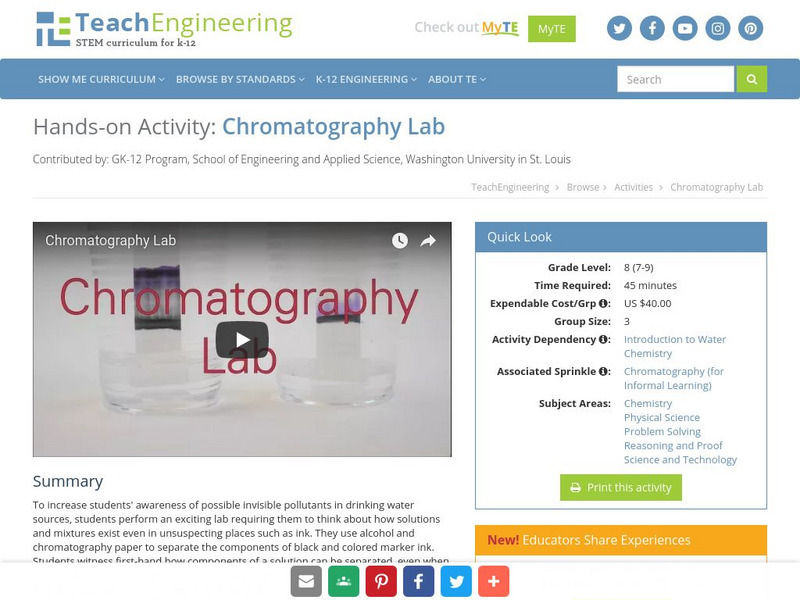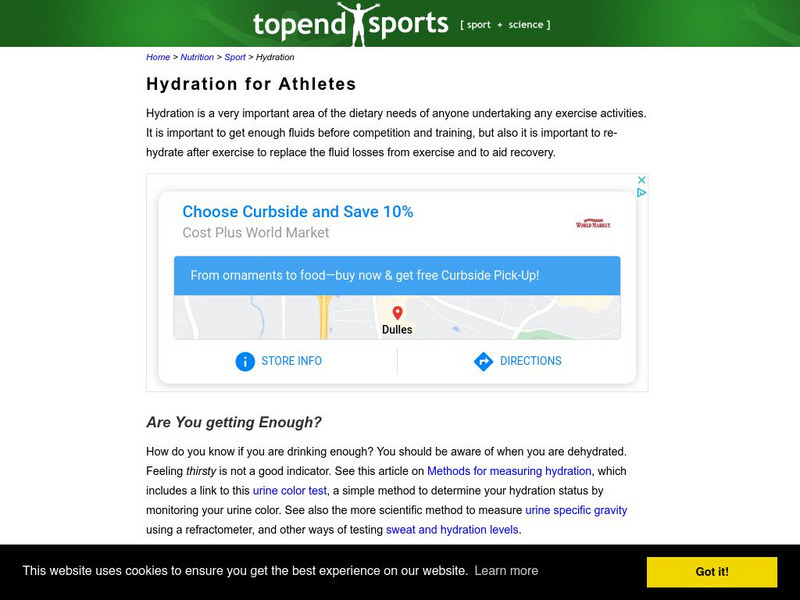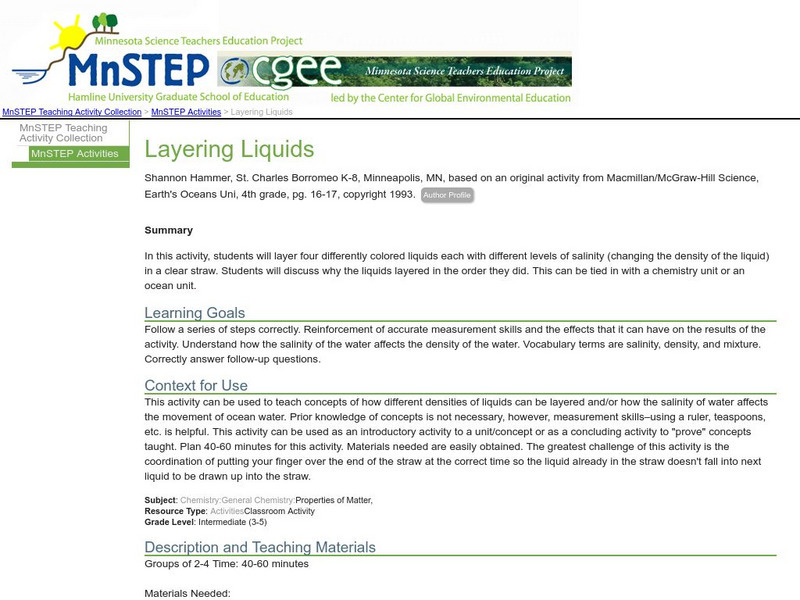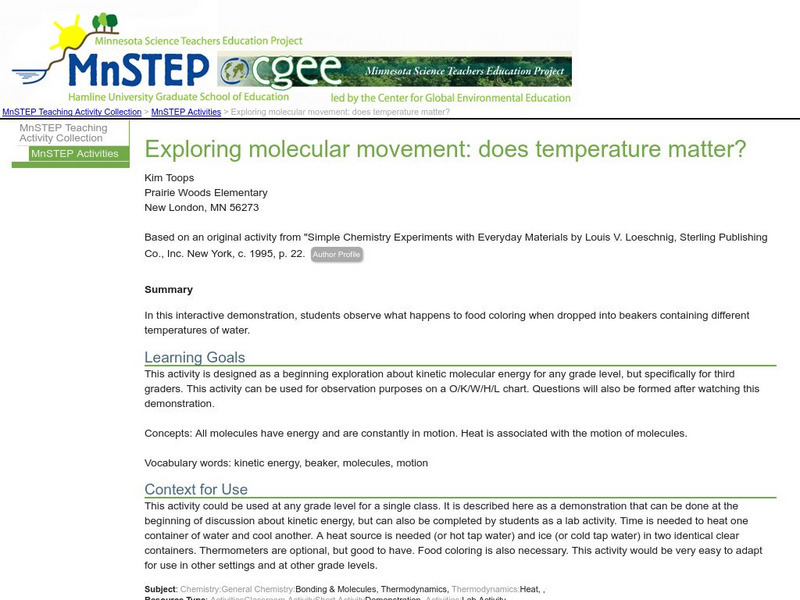Other
Project Wet: Discover Water
Interactive opportunities which emphasize the impact water has on our lives. Explore watersheds, ocean water, fresh water sources, and ways to use water responsibly by engaging in activities, coloring pages, and short quizzes.
Science Education Resource Center at Carleton College
Serc: Mn Step: Sinking and Floating Water
An experiment in density where colored water, both hot and cold, are poured into containers of water at room temperature. Young scholars will observe that the warm water rises and the cold water sinks due to their different densities.
TeachEngineering
Teach Engineering: Dna Forensics and Color Pigments
Students perform DNA forensics using food coloring to enhance their understanding of DNA fingerprinting, restriction enzymes, genotyping and DNA gel electrophoresis. They place small drops of different food coloring ("water-based paint")...
American Chemical Society
Inquiry in Action: Using Color to See How Liquids Combine
An activity where students use the characteristics of liquids when they combine with water to tell the differences between them. Activity includes both student and teacher instructions.
Other
Grace Communications Foundation: Water Program
Tools and information focusing on water conservation and actions people can take to reduce their "water footprint" in daily life. Proves a "water footprint" calculator, tips for saving water around the house, and a collection of...
Museum of Science
Museum of Science and Industry: Online Science: Color Changing Carnations
A popular plant experiment where food coloring is added to the water that flowers sit in, to see how this affects the color of the flowers. It demonstrates how water travels through the xylem of a flower stem.
Center of Science and Industry
Cosi Columbus: Coffee Filter Rainbows
Science experiment that demonstrates chromotography. Includes full list of materials, procedures, and scientific explanation of what happens with different colors when they are soaked with water.
TeachEngineering
Teach Engineering: Chromatography Lab
To increase students' awareness of possible invisible pollutants in drinking water sources, students perform an exciting lab requiring them to think about how solutions and mixtures exist even in unsuspecting places such as ink. They use...
Science Education Resource Center at Carleton College
Serc: Investigating Chromatography: Separating Pigments
In this chromatography experiment, learners will investigate pigments used to create a black, water soluble marker. An extension can be done using primary and secondary colored water soluble markers as well as spinach leaves.
PBS
Pbs Teachers: Paper Towel Chromatography Experiment
Observe the separation of colors derived from black marker ink by wicking water through a marker line on a paper towel.
TeachEngineering
Teach Engineering: Engineering for the Earth
Young students are introduced to the complex systems of the Earth through numerous lessons on its natural resources, processes, weather, climate and landforms. Key earth science topics include rocks, soils and minerals, water and natural...
Other
Top End Sports: Hydration for Athletes
Find brief articles that will teach you about the importance of hydration and how to stay hydrated during sports and physical activity. Learn about choosing drinks, drinking enough water, and checking yourself for hydration and...
Other
K 3 Learning pages.com: Earth Day Links
How can you celebrate Earth Day in your classroom? This collection features several downloadable Earth Day worksheets including word searches and coloring pages. Students and teachers can plan the perfect way to recognize the environment.
Other
60 Second Science: Rolling Down Ramps Experiment
Explore the characteristics of inclined planes while observing how drops of colored water flow down a ramp and on different surfaces.
Optical Society
Optical Society of America: Optics for Kids: Release the Rainbow
A simple activity to demonstrate how light separates into colors when it passes through water acting as a prism.
Optical Society
Optical Society of America: Optics for Kids: Black Is Black or Is It?
An experiment with a coffee filter and a marker to see what happens when water touches a black dot, or any other color. With links to several scientific, academic articles that explain what is happening.
Science Education Resource Center at Carleton College
Serc: Layering Liquids
A lab activity to show students how different densities of liquid layer on top of each other by using four different colored liquids that contain different levels of salinity. This activity can also be used in an ocean unit where...
TeachEngineering
Teach Engineering: Glowing Flowers
Student teams learn about engineering design of green fluorescent proteins (GFPs) and their use in medical research, including stem cell research. They simulate the use of GFPs by adding fluorescent dye to water and letting a flower or...
The Franklin Institute
The Franklin Institute: Treasures at Sea
Learn about ocean systems and habitats. Lots of reading, writing, games, and interactive activities. Colorful and fun.
Science Education Resource Center at Carleton College
Serc: Measuring Liquid Volume
In this lab, young scholars will measure and combine colored liquids to receive the expected results. The intended outcome would be to take primary colored liquids, measure them and combine them to create a "rainbow" colored set of water...
Science Education Resource Center at Carleton College
Serc: Exploring Molecular Movement: Does Temperature Matter?
In this interactive demonstration, students observe what happens to food coloring when dropped into beakers containing different temperatures of water.
Science Education Resource Center at Carleton College
Serc: Exploring Molecular Movement: Does Temperature Matter?
In this interactive demonstration, students observe what happens to food coloring when dropped into beakers containing different temperatures of water.
Science Education Resource Center at Carleton College
Serc: Mn Step: What Makes Thunderstorms? See Convection
Using water, food coloring, and an ice cube, students observe the movement of convection currents in a container, and illustrate what they see happening. This activity develops their understanding of how thunderstorms form.
Smithsonian Institution
Lemelson Center: Spark!lab: Inspired by Nanotechnology [Pdf]
Introducing students to nanoscale in nature and in technology, a simple activity through which students create a colorful nanofilm using construction paper, nail polish, and a pan of water.
















